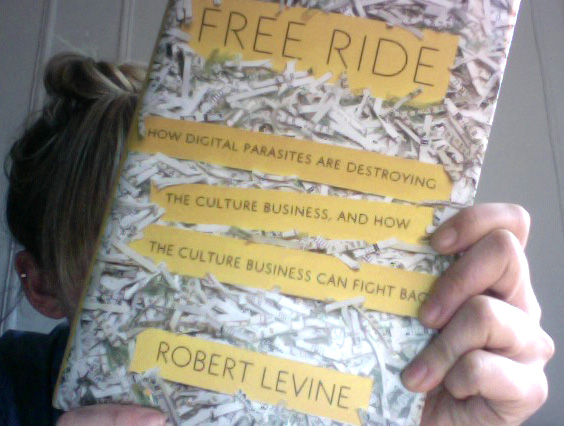Is Something Worth Nothing Just Because It's Digital?
Instagram/Facebook announced today that it has the right sell user's Instagram photos without notification or payment. And unless you delete your account by January 16th, you will never be able to opt out. What the WHAT?
I'm not an Instagram-er myself (if only because I'm still of the Dumb Phone Tribe), but this gets me pretty heated because it taps into an issue that I think we've got to address and that is: When is it ever ok to not pay someone for their work? And what is it about the internet in particular that makes it so easy to do that to each other and ourselves?
I read a GREAT book this year called Free Ride: How Digital Parasites Are Destroying the Culture Business, And How the Culture Business Can Fight Back by Robert Levine, which addresses just that. In the book's introduction, Levine states:
Amid the Internet's astonishing array of choices, statistics show that most consumers continue to engage with the same kind of culture they did before-- only in a way that's not sustainable for those who make it.
A.k.a. we still like words, we still like pictures, we still like music, but we ain't paying the creators of those things anymore. He goes on:
Much of the enthusiasm for free media comes from mistaking the packaging for the product. If you believe people once paid $15 for silver plastic discs, it's only natural to think online distribution will revolutionize the recording business. But if you realize people were paying for the music on those disks, it's obvious that someone still has to make it-- and that someone probably wants to get paid.
So who IS making the money? Mostly big fat middlemen like YouTube and Facebook who use your free content as their content for which they get paid.
I was especially fist-pump-y (as in, reading on the couch and enthusiastically yelling "YEAH!" like a psyched up football player every other paragraph) about his chapter on paper vs. digital books. For example, when countering the argument of 'ebooks cost next to nothing to make, so why should we pay more than next to nothing to read them?' he writes:
But books, like all media products, have never been priced according to their marginal cost: it doesn't cost anything close to $25.00 to print a single copy of a hardcover book. [More like $3.50, he later says.]... Like record labels, publishers do much more than manufacture and distribute; they advance money to creators, shape projects, and help them find an audience. ... Although technology has revolutionized the process of distributing books, it hasn't fundamentally changed the process of writing one.
Yes, yes, and yes!
Look, I'm not saying that we should go back to the way things were. Let's embrace new technology! But let's do do it in a way that benefits the creators of culture, not just the online distributors of it. How exactly to do this is naturally complex, and like Levine, I hope we as a country get some better laws in place that protect creators. But until then, we can strive to be supportive as individual consumers. That means everything from paying for that album (instead of illegally downloading it and listening to it to see if you like it enough to buy it) to properly citing photos you've snagged from other blogs.
Nothing's free. And if we keep pretending that all modern media should be, then no one's ever going to make a living from it which means less and less people are going to want to devote their lives to creating things which is just a damn shame all around.

